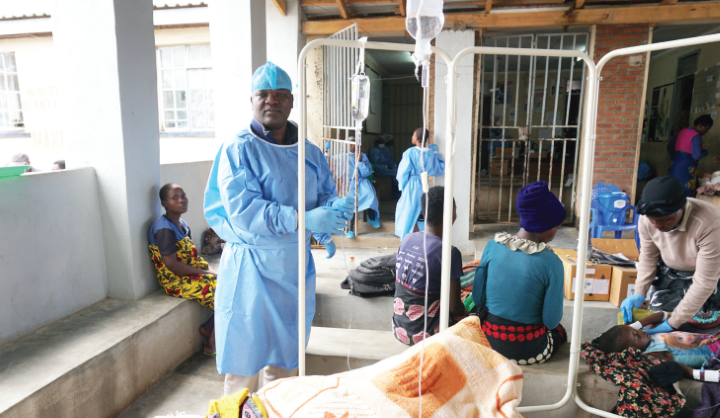Fighting for prisoners rights
Africa’s fallen hero Nelson Mandela, once said: “No one truly knows a nation until one has been inside its jails.”
Joseph Moyo (not real name) of Msambuka Village, Traditional Authority (T/A) Malemia in Zomba is half-way through a six-year jail sentence at Zomba Prison. Looking at a photograph that was taken three years ago, Moyo wonders if the jail sentence is meant to reform or torture him.

In the photograph, he looks healthy and light in complexion. But in person, the father of four looks thin, unhealthy and his complexion has gone dark. His skin is covered in a rash that he keeps scratching. As he narrates his story, it is clear that he is not proud of himself.
“I stole K50 000 that was meant to buy maize for my boss. I was sentenced to six-years imprisonment. Life is tough here and I do not think I still have any human right,” he says, adding prison life has exposed him to a tough life.
Hesitantly, he explains how they survive. “We live on a meal a day and sleep in a seated position because of congestion. We use a pail to relieve ourselves during the night,”
On his left leg is a big cut he sustained while chopping firewood almost a year ago.
“Several times,” he says; “I have been to the prison clinic for different ailments and most of the time there are no drugs. We hardly take a bath and the congestion in the cells fuels transmission of airborne diseases”
Centre for Human Rights Education, Advice and Assistance (Chreaa) recently took members of the media to the prison to appreciate the conditions at the facility, and it was evident that the prison is struggling to support the prisoners and accord them some of the rights which are not supposed to be lost due to detention.
Section 42.1b of the Constitution of the Republic of Malawi provides for the right to be detained under conditions that do not compromise human dignity, which includes at least the provision of reading and writing materials, adequate nutrition and medical treatment at the expense of the State, among others.
However, although the legal framework safeguards the rights of prisoners, the prison conditions do not conform to the standards set by the Constitution or international instruments which Malawi ratified.
In the case of Gable Masangano versus Attorney General and others, in which government was sued for failing to respect some human rights of detainees by denying them some basic services, the court stated that although prisoners may have their right to liberty curtailed by reason of lawful incarceration, prisoners retain all other human rights as guaranteed by the Constitution.
The court further stated that the prison regulations do not represent an aspiration for the government to live up to, but instead represent minimum standards for the treatment of prisoners of which the government must comply. The court also rejected government’s argument that they do not have the minimum resources to comply with the law, stating that lack of resources is not a defence.
Still, conditions in most of the country’s prisons remain poor. While briefing Chreaa and other officials from the Ministry of Finance, Assistant Commissioner of prison Raphael Mushali told the gathering that the challenges at the prison are beyond their control.
“This prison was constructed almost 50 years ago to accommodate 800 prisoners, but now we have 2 118 inmates. This is too much for us. Had it been that we were getting enough funding to cater for the prisoners, our only problem would have been congestion. But most times we do not have adequate food, fuel and drugs at the clinic. All cells have no toilets,” said Mushali.
Chichiri Prison, whose capacity is also 800, has 1918 prisoners while Mzuzu Prison, which is supposed to keep 290, currently has over 500. The conditions in all these prisons are the same.
Paradoxically, the prison service has been getting less than half of their required funding. A budget document sourced by The Nation reveals that in 2011/2012, the Prison Service proposed K104 821 000 and only K44 676 829 was approved. In 2012/2013 they required amount was K269 705 830 and only K52 164 692 was approved, while in 2013/2014, K142 540 889 was required by the prison but they were given only K60 304 375.
Malawi Prison Services’ director of health Dr Henry Ndindi says poor funding is denying prisoners some of their rights such as the right to good health. He also says diseases such as skin rashes and tuberculosis are worse in prisons due to congestion, which threatens the prisoner’s health.
“We receive new doctors, but they do not stay long because of high population and poor health of most prisoners which increases the doctors’ workload,” says Ndindi.
Thus, Chreaa with funding from Tilitonse, is implementing a two-year project titled Achieving Responsiveness and Accountability of the Prison Service in Health Service Delivery System in Malawi.
Executive director of Chreaa, Victor Mhango, says the objective of the project is to ensure there is access to medical health services for all prisoners and that there is adequate resource allocation to prison services.
“We have visited several prisons and the conditions are bad. I hope the meetings we are having will influence authorities to increase budget allocation to the prison service,” Mhango says.
As the lobbying for better prison conditions continues, the biggest challenge is probably controlling congestion in prisons.
Clifford Msika, Paralegal Advisory Service Institute (Pasi) national director, says it is high time the sentencing system is reviewed.





